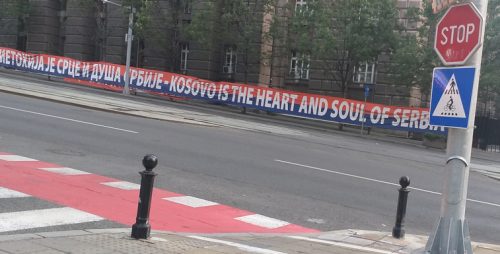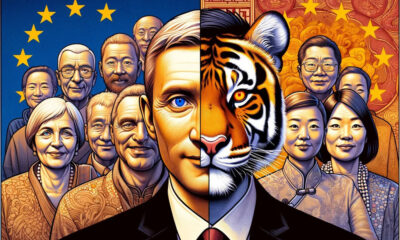Egyesült Államok
JUPITER ÉS A TÖBBIEK: Plenković, a poliglota, avagy van-e hasonlóság a Krím és Koszovó között?

A Kijevben zajló Krími Platform alakuló ülésén a felszólalók támogatták Ukrajna területi egységét, és annak a véleményüknek adtak hangot, hogy az Oroszország által 2014-ben annektált Krím-félsziget továbbra is Ukrajnához tartozik. Ezt variálták a jelenlévő küldöttségek, köztük a NATO 30 országa és természetesen a minden (európai) lében kanál horvát miniszterelnök, Andrej Plenković is.
Krím és Koszovó
Plenx – ahogy a zágrábi csapszékekben nevezik a horvát miniszterelnököt – ismét megcsillogtatta nyelvtudását, és ukránul szólalt fel az ukránok legnagyobb örömére és lelkesedésére.
Ő is támogatásáról biztosította az ukrán barátokat, és szertartásosan megismételte, hogy Krím = Ukrajna. Hallelúja!
We do not and will not recognize the illegal annexation of Crimea and Sevastopol by Russia.
The #CrimeaPlatform has our utmost political support to make sure that the situation remains high on the international agenda. #CrimeaIsUkraine
With @ZelenskyyUa pic.twitter.com/dnJUnPwq4l
— Charles Michel (@eucopresident) August 23, 2021
Körülbelül ennyi, amit tudni érdemes az eseményről, mert a helyzet – különösen az afganisztáni felsülés után – meglehetősen egyértelmű: a platfomról sugárzott “erős üzenetek” inkább a Nyugat tehetetlenségéről tanúskodnak, mint bármi egyébről. 
Fordítva is valahogy így van, az oroszok és a szerbek is szervezhetnének egy hasonló csődületet, amelyen kinyilvánítanák, hogy Szerbia = Koszovó! Vagy – ahogy azt a belgrádi külügyminisztériumnál kifeszített felirat hirdeti szerbül és angolul: Koszovó Szerbia szíve és lelke.
Nyilván a kijevi és az esetleges belgrádi összeröffenés szereplői nem ugyanazok lennének.
Hány hadosztálya van a pápának?
A régi adoma szerint, Sztálin kérdezte ezt, amikor figyelmeztették, hogy nem illik ujjat húzni a Vatikánnal.
Ennek a magyar megfelelője az erősebb kutyák nemi életéről szóló mondással egyezik meg, illetve arra a nemzetközi jogi és egyéb realitásra hívja fel a figyelmet, hogy a nagyhatalmak többnyire azt csinálnak, amit akarnak, a kicsik meg, amit szabad nekik.
A diplomácia, a tárgyalásos megoldás csak abban az esetben vezet eredményre, ha az érintettek hajlandók elfogadni, amit a nagyhatalmak, és a legnagyobb hatalom elvár tőlük. Ha nem, akkor jönnek a szankciók.
Afganisztán után mindenfelé levonták a tanulságokat, így a Közel- Keleten is arra a megállapításra jutottak, hogy a világ jóval veszélyesebb hellyé vált, mint amilyen mondjuk, tíz évvel ezelőtt volt. És hogy a legnagyobb hatalom sem mindenható.
Mindeközben a kudarc után az amerikaiak hazahurcolkodtak, és itt hagyták a problémát nekünk.
A tálibok diadalmenete, ha egyáltalán diadalmenet, és nem gyászmenet lesz, sokba fog kerülni nekünk, és mi európaiak jobban tennénk, ha elgondolkoznánk a hadseregek állapotán, illetve létszámán.
A hidegháború utáni leépítések naiv optimizmusa, és az elbürokratizálódott európai vezetések “lótuszevő politikája” oda vezetett, hogy az EU nemzetközi befolyása csak papíron létezik.
Szerencsére Európát nem fenyegeti semmilyen komolyabb külső veszély – az orosz veszély jelen pillanatban nem igazán reális fenyegetés, mondjon ki mit akar -, viszont a migránsválság és a terrorizmus még óriási galibákat okozhat, és hosszú távon az “európai mulyaság” nem áll nyerésre. Allah akbar.
Brüsszelnek hány hadosztálya van?
Nem minden malícia nélkül olvassa az ember az 550 kilométer hosszú litván határkerítésről szóló híreket.
Mint kiderült, valahogy ez teljesen kóser, szemben a magyar autoriter/náci/sötét múltból előkerülő határzárral, hogy a török, a görög, a bolgár és a macedón falakat és kerítéseket ne is említsük.
A Willkommen-kultúra is valahogy eltűnt, egybehangzó EU-s vélemények szerint nem engedhetjük meg, hogy megismétlődjön 2015, Merkel asszony pedig a közeljövőben nyugdíjba vonul, miután még kiverte az Északi áramlatot az oroszokból – miközben a jó öreg Európa jócskán megnehezítette a ki tudja milyen, Balkán áramlat létrejöttét Bulgáriában.
Merkel ezzel biztosította Németország energiaellátását és tranzitország mivoltát, amire a fenti kutyás hasonlat ide is illik.
Bár erről senki sem mer nagyon beszélni, Franciaországban továbbra is romlik a helyzet, és úgy általában az európai polgárok megszeppenve figyelik összkomfortos világuk kopását, zsugorodását.
A bajok pedig nem hogy nem múlnak, hanem szaporodnak.
Feltűnt-e a kedves olvasónak, hogy a világpiacon égbe szökő olajárak miatt mindenfelé drágul a mindennapi betévő falat? Vagy úgy találja, hogy ez nem érdekes?
Pedig innen egyenesen oda vezet az út, hogy egy szép napon valaki felteszi a kérdést, hogy Brüsszelnek hány hadosztálya van. Vajon mit fogunk válaszolni?
-

 Szerbia7 nap telt el azóta
Szerbia7 nap telt el azótaSzerbiában máris kezdeményezik az atomtilalmi törvény eltörlését
-

 Szerbia7 nap telt el azóta
Szerbia7 nap telt el azótaDodik tagadja a srebrenicai népirtást, Vučić pedig küzd a boszniai szerb álláspontért
-

 Szerbia5 nap telt el azóta
Szerbia5 nap telt el azótaA jelek szerint Szerbia nemcsak Ukrajnának, hanem Izraelnek is szállít fegyvert 🇮🇱🤝🇷🇸
-

 Szerbia5 nap telt el azóta
Szerbia5 nap telt el azótaMagyarország nem támogatja Koszovó ET-tagságát, sem a Srebrenicáról szóló ENSZ-határozatot






























































